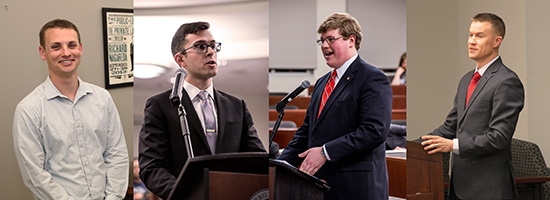Four students in Vanderbilt’s Appellate Litigation Clinic have succeeded on appeal in Luis v. Awareness Technology, a case addressing Internet privacy rights. In an opinion issued by a Sixth Circuit panel that included Judges Alice M. Batchelder, Gilbert S. Merritt Jr. ’60 and Ronald L. Gilman, the court ruled 2-1 that a Tampa, Florida, man could sue a company that makes spyware and markets it specifically “to catch a cheating spouse.”

The case, which was briefed by 2016 graduates Calvin Cohen, Larry Crane-Moscowitz, Alex Vey and Clayton Wiggins, involved an Ohio husband’s use of spyware manufactured by Awareness Technologies to monitor emails and instant messages between his wife and a Tampa, Florida, man, which he then used in divorce proceedings against her. The Tampa man, Javier Luis, filed suit against the spyware company, Awareness Technologies, in 2012, alleging its “Webwatcher” product violated the federal Wiretap Act, which prohibits the intentional interception of private electronic communications. A federal district court dismissed Luis’s suit in 2014, ruling that Awareness Technologies could not be held liable for the “misuse” of its product.
Listen to Clayton Wiggins’ oral argument in Luis v. Awareness Technologies
Wall Street Journal‘s Law Blog commentary on Luis v. Awareness Technologies
Vanderbilt University News story: Appellate Clinic victory
“This was a big victory for privacy rights,” said Mark Pickrell, who now teaches the Appellate Litigation clinic.
Represented by the Vanderbilt Appellate Clinic, Luis appealed on the grounds that Awareness Technologies specifically advertised its product for an illegal use, “enticing [customers] with the lure of finding out everything that goes on in the targeted computer’s private accounts” without the user’s knowledge, and that—because Awareness routed recorded emails and messages through its servers before delivering them to the customer—the company itself had violated the Wiretap Act.
“These students worked their fingers to the bone in this case, and the victory is a great reflection of their efforts,” said Alistair Newbern, who taught the Appellate Clinic from 2008 to spring 2016.
Wiggins, who argued the case, received news of the victory while preparing to depart for Okinawa, where he will be stationed as a member of the Marine Judge Advocate General Corps. Wiggins managed to argue the case despite a several case of laryngitis. “On the morning of the argument, Clayton woke up with absolutely no voice,” Newbern recalled. “After much Googling of laryngitis remedies, we managed to get him a gravelly squeak by the time he had to go on. He did a fantastic job, and at the end of the argument, Judge Batchelder said she hoped he would come back to the court when he had a full voice because he had performed so well with a limited one.”
Cohen is a law clerk for Judge Theresa Springmann of the U.S. District Court for the Northern District of Indiana; Crane-Moscowitz has joined White & Case in York as an associate; and Vey works in the Tennessee Attorney General’s office in Nashville.